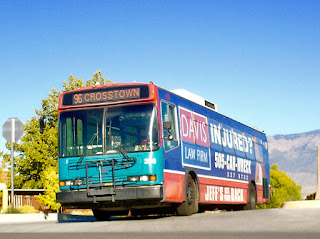BUS STORY # 29 (Willa’s Bus Stories # 1 and 2)

Willa* is another Presbyterian nurse who rides the bus. She lives west of Tramway, so she doesn’t have the schedule issues Amy has. We share part of the inbound Lomas-Rapid Ride route a few times a month. She says her husband would rather she drive, but she’s never had any trouble riding the bus. I believe her. Willa is a pretty imposing woman. For one thing, she’s a big woman. For another, she has that old school old nurse style of laying down the law for God and doctors and no back talk. Anyone whose survival sensors are reasonably intact won’t even think about messing with Willa.
Like any veteran bus rider, Willa has her stories. Her first story is about a woman who boards the bus and then stands in the aisle scanning the passengers until she spots a male sitting by himself. She moves to the seat beside him and starts talking to him. Eventually, she works the conversation around to the question “Do you have a girl friend?” followed by “I could be your girl friend. If I were your girl friend, you could by me a Sony DVD player.” The woman goes on to explain they cost thousands of dollars and asking the prospective boyfriend what he knows about them, about how they work, and so forth. Willa confesses being tempted to tell her about the ads she sees on a regular basis advertising Sony DVDs at Wal-Mart for under fifty dollars. “But she’s as unlikely to have fifty dollars as a thousand.”
Her second story also involves a female rider, another regular, who sits in the back of the bus and has conversations with herself (or “her selves” as Willa explains it). Sometimes the woman gets rather “graphic” in her conversations, and the bus drivers have been known to stop the bus and go back and warn her they’ll have to put her off the bus if she doesn’t tone it down. One night, one of the drivers actually made her leave. Afterwards, Willa’s occasional seatmate, a professor at UNM, said to her, “I wonder what kind of drugs she’s on.”
“Oh, she’s not on drugs. She’s schizophrenic.”
“How do you know that?”
“Because I’m a nurse. That’s classic schizophrenia.”
She went on to explain how her very first job out of nursing school was in an outpatient behavioral health program for geriatric patients. “That’s the most enjoyable job I’ve ever had.” And it’s some of the folks on the bus rides that have her thinking about going back after she retires.
__________
*Real name changed.



